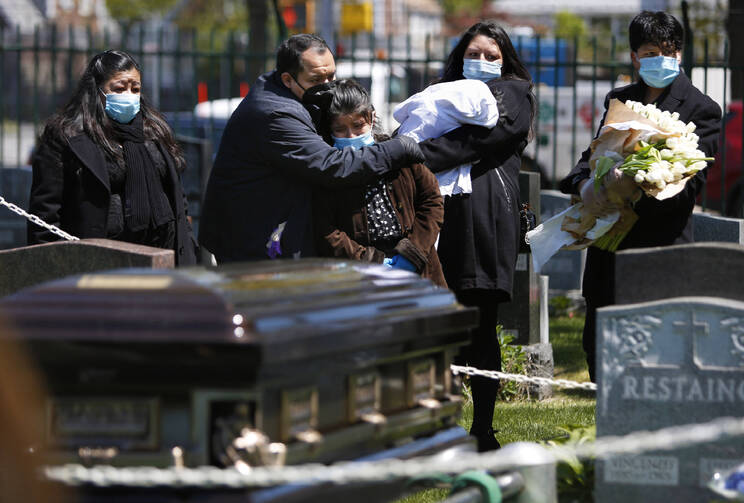NEW YORK (AP) — The Rev. Joseph Dutan recalls how he lifted the chalice in the empty church and felt a flood of emotions: grief, the pain of isolation, even doubt.
But also, the promise of hope that is the gift of every Easter -- even in the midst of a pandemic that had already robbed him and his community of so much, and threatened to take so much more.
He prayed for the soul of the Rev. Jorge Ortiz, his mentor and the first Catholic priest in the United States to die from the novel coronavirus. He prayed that he could console a community that could not gather to mourn Ortiz' passing.
And he offered a more personal prayer: for his own father, struggling with COVID-19.
"God," he prayed, "I'll follow my vocation, but please take care of my dad."
It was not the first time Dutan had faced death. He has officiated at funerals. And before he followed his calling, he was treated successfully for leukemia at the same hospital where his father was on a ventilator, fighting for his life.
But for this 32-year-old priest, the weeks of the pandemic have been a unique struggle.
He has been overcome with emotions for his family and St. Brigid parishioners. "Hearing their pain, you could relate," he said.
The harm caused by the virus is all around him: The funeral home across from St. Brigid, always busy. The blaring sirens of ambulances speeding near the church in this area straddling Brooklyn and Queens, which have some of the highest number of infections in New York City.
Dutan estimated that dozens of St. Brigid's parishioners have been infected and said that at least three have died from COVID-19 complications since Ortiz's death.
Parishioners are unemployed. Others are undocumented -- "They come from Ecuador, Mexico, the Dominican Republic, Panama, from all over the world" -- and many of them live in cramped apartments that don't allow for social distancing, rendering them vulnerable.
"You start to see how the community is being affected," Dutan says.
Through the crisis, he has advised the church youth group on Zoom, celebrated Mass in English and Spanish on Facebook via livestream, and taken calls from worried parishioners.
"Father Joseph was one of the first people that we called. I flat out told him: 'We're scared.' I don't know what to do, not just about losing Father Jorge, but my parents are sick," said Tiffany Velez, 27, whose parents contracted the coronavirus.
"The minute I called him he was so calm, cool and collected. He shared his personal story."
Ortiz was his close friend -- Batman to Dutan's Robin, said Robert Velez, a parishioner who was married by Dutan. They had lived together in the rectory. Dutan brought Ortiz food when he fell ill, called the ambulance when his condition worsened. On their last call, he implored his mentor to recover, so they could sing together at the Easter service.
Ortiz was 49 when he died on March 27.
Days later, Dutan's 56-year-old father, Manuel, was rushed to New York-Presbyterian/Weill Cornell Medical Center in Manhattan. When he took a turn for the worst on Good Friday, a hospital chaplain performed the last rites. By the next day, his condition improved.
"It was a roller coaster," Dutan said.
He admits he has faced doubts.
"I sometimes feel unworthy. I say, 'Wow, the Lord chose somebody who is very unworthy to consecrate somebody unworthy to bring his body and blood to others, to comfort others,'" he said.
Then, he remembers Ortiz's favorite word: "Animo!" Courage!
"And then I pick myself up," he said.
Dutan was born in Woodside, Queens, and grew up in a large, devoutly Catholic Ecuadorian family. He said he first felt a calling to serve God when he was in fifth grade in the '90s, but he ignored it because "you know, you want to be the cool kid on the block."
He attended Vaughn College in Queens, where he excelled at electronic engineering. While there, he fell ill with a rare form of leukemia. He fell into a deep depression, thinking that his dreams of having a family of his own, of buying a car or owning a home, were all over at the age of 20.
One day, a priest came to his hospital room. He said: "`Joseph, who said you're going to die? Only the Lord has the last word.' ... I remember, just those words echoing every time," Dutan said. "That's when I started seeing things in a different way."
He went back to college, but the draw of the priesthood was strong. He dropped out just one semester before graduation. His father, a chef at a French restaurant, was furious and wouldn't talk to him for a month. He felt his son was throwing away his career.
With time, Manuel Dutan changed his tune. He would often be seen at the church pews and would proudly introduce him to friends and strangers as "my son, the priest."
On April 30, Dutan celebrated a Mass that coincided with his 32nd birthday. The church was empty, but the service was followed online by many who thanked him for his work and sent him greetings in real time. He also received a live surprise: After weeks of isolation, his whole family waited for him outside of the rectory with balloons, banners and a birthday cake.
It was, he said, "A moment of joy ... a moment of light after all these moments of darkness, you finally see a light there."
But the light flickered. "I just got off from a call with my mother," he said, on a recent day. "My father is in a very bad state. His heart is slowly, slowly stopping."
On May 5, Manuel Dutan died. His son pressed on, in his empty church.
"I feel at peace right now," he said. "I'm at a good point knowing that he's not suffering anymore."









